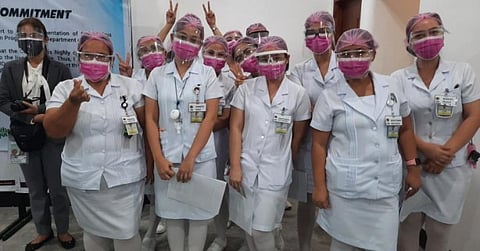
- NEWS
- the EDIT
- COMMENTARY
- BUSINESS
- LIFE
- SHOW
- ACTION
- GLOBAL GOALS
- SNAPS
- DYARYO TIRADA
- MORE

Several hospitals have hired about 300 clinical care associates nationwide to compensate for the lack of nurses in the Philippines, a Palace advisory body said on Friday.
In a Palace meeting earlier this week with President Ferdinand Marcos Jr., Private Sector Advisory Council Health Sector Lead Paolo Borromeo said the CCA positions were created under the Marcos Administration for nursing school graduates who still need to pass the board exams.
Borromeo, president and CEO of Ayala Healthcare Holdings Inc., added that Commission on Higher Education chairperson Prospero "Popoy" De Vera had asked for 1,000 CCAs, but "now it's just 300."
"A thousand CCAs is not a small number in a country where we graduate about 7,000 to 10,000 nurses yearly," Borromeo said.
"That's an instant addition to our nursing population. If we can fill the seats that Chair Popoy was able to get, that's a thousand CCAs, but now 300 pa lang. A thousand CCAs is not a small number in a country where we graduate about 7,000 to 10,000 nurses a year," Borromeo added.
Last year, Marcos Jr. witnessed the signing of a memorandum of understanding with the PSAC, the Department of Health, and the Commission on Higher Education. The MOU would provide employment opportunities for the unlicensed nursing graduates.
"It allows (t)hose nursing graduates who have taken their boards and have not been able to pass the board this time, will be allowed to work nonetheless if they can establish their competencies in certain subjects of the nursing curriculum," Marcos had said during the MOU signing in 2023.
"And that way, they can get to work immediately," he said.
Meanwhile, Borromeo also updated Marcos Jr. about the Enhanced Master's Nursing Program, the Clinical Care Associates Program for nursing graduates who are still in school, and the two-way labor deals with other countries that train and send Filipino nurses to work in other countries.
Borromeo said the Enhanced Master's Nursing Program seeks to increase the number of nursing educators in the nation.
In order to allow program graduates to become teachers, CHED reduced the three-year Master's Nursing Program to one year.
On the other hand, 16 higher education institutions will host the master's program launch by the PSAC in the 2024–2025 academic year.
Referring to the pilot MOU with Austria, Borromeo stated that bilateral labor agreements with other nations are also a significant victory for the nation's nursing industry.
The MOU states that the Austrian government will fund scholarships, support for faculty, and an adopt-a-school/hospital program. One of PSAC's next initiatives will be to urge the President to sign the MOU.
Other initiatives include the National HRH Masterplan, the Balik Nurse Campaign, and Underboard Certificate Programs.
While PSAC still needs to clarify the details of the Balik Nurse Campaign program and will look at a pilot launch in the Middle East, TESDA and CHED are currently discussing the Underboard Certificate Programs.
The PSAC, led by Aboitiz Equity Ventures, Inc. President and CEO Sabin Aboitiz, comprises business executives and industry specialists who give the President technical recommendations on accomplishing the government's economic goals.
